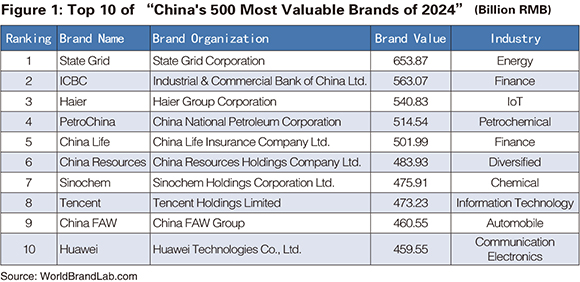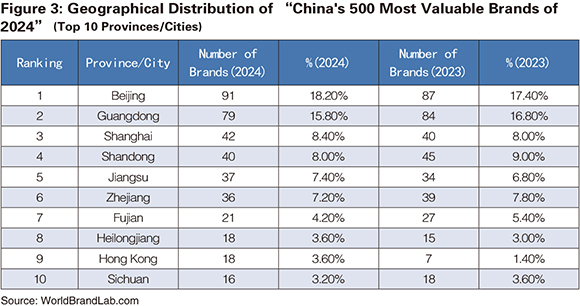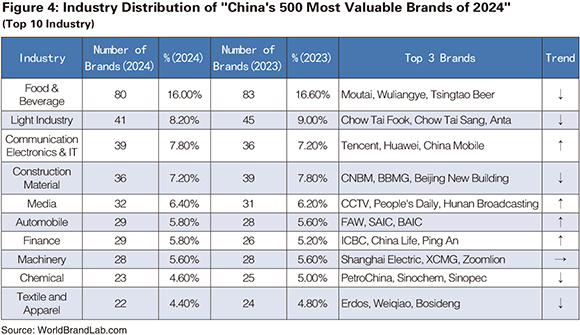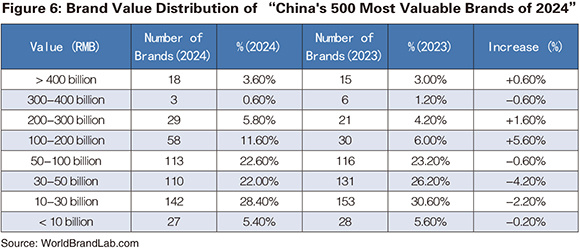The 21st World Brand Summit was held on June 19th in Beijing. The organizer, World Brand Lab, released the report of “2024 China's 500 Most Valuable Brands list”. In this annual report based on financial data, brand strength and consumer behavior analysis, State Grid topped the list with a brand value of 653.89 billion RMB. Also occupying the top five on the list are Industrial and Commercial Bank of China (563.07 billion RMB), Haier (540.83 billion RMB), PetroChina (514.54 billion RMB), and China Life (501.99 billion RMB). These brands have stepped into the world-class brand tier. Management gurus from Harvard, Yale, Oxford and INSEAD attended the World Brand Summit and delivered keynote speeches. They discussed with 600 on-site entrepreneurs and managers on the topic of "Disruption and Reinvention: A roadmap for enhancing brand value through digital technology".

The total value of China's 500 Most Valuable Brands of 2024 is 38.57 trillion RMB, an increase of 4.24 trillion RMB or 12.35% over last year. Dr. Steve Woolgar, Chairman of the Academic Committee of World Brand Lab and Emeritus Professor of Marketing at University of Oxford, said, "Over the past 20 years, I have witnessed the remarkable rise of Chinese brands, some of which have already had a strong global influence. These brands include State Grid, Haier, Sinochem, China Resources, China Southern Power Grid, Poly, HBIS, China Huadian, Wuliangye, Xuzhou Construction Machinery, TSINGTAO Beer, Air China, Beidahuang, Dongfang Electric, Tongwei, Bosideng, Feihe, China National Aviation Fuel, Hengli, Golden Concord Group, Power Dekor, JOMOO, Changhong, Double Star, etc." This is the 21st year that World Brand Lab has compiled the China brand report. In 2004, the entry threshold was only 500 million RMB, and the average value of the top 500 brands was 4.94 billion RMB. In 2024, 21 years later, the entry threshold has been raised to 3.83 billion RMB, and the average value of the top 500 brands is as high as 77.14 billion RMB, representing an increase of 1,460.59%. A total of 108 Chinese brands are valued at more than 100 billion RMB this year, an increase of 36 brands from last year, highlighting the prosperity of China's brand economy.

According to the analysis by World Brand Lab, the competitive strength of a region mainly depends on its comparative advantages, and brand benefits directly affect the formation and development of the regional comparative advantages. Brand is an important symbol of a region's development while brand and regional economic growth are interlinked. In terms of the regional distribution of China's 500 Most Valuable Brands, Beijing ranked first with 91 brands, as the headquarters of central enterprises with strong profitability are concentrated in Beijing. Guangdong and Shanghai ranked second and third with 79 and 42 brands respectively. Brands on the list can be divided into national and global brands according to the scope of influence of these selected brands. There are 431 brands with national influence on the list, accounting for 86.20%; and 69 brands with global influence, accounting for 13.80%.

In this year's "China's 500 Most Valuable Brands" list, brands from 24 industries, including food and beverage, light industry, construction material, media, textile and apparel, medicine, machinery, etc., were selected. The food and beverage industry remains the industry with the most brands selected, with a total of 80 brands, accounting for 16.00% of the list. The industries ranking second to fifth are the light industry (41), communication electronics and IT (39), building materials (36), and media (32), respectively. In measuring brand loyalty, World Brand Lab referred to the rating data from iTrust Rating. In measuring brand leadership, especially ESG (environmental, social, and governance) scores, World Brand Lab referred to the ESG database of SuperFinance. Carboncare International's measurement of corporate carbon emissions was also used to promote the addition of the "carbon score" label to brands.

The topic of this year's World Brand Summit is "Disruption and Reinvention: A roadmap for enhancing brand value through digital technology". Dr. John Deighton, Emeritus Professor of Business Administration from Harvard Business School, indicated that first, all marketing is now digital marketing. The effect of the digital transformation is that marketing now feels much more personal than in earlier times. But the new challenge is to find the mass scale of those earlier times. Second, we are on the brink of the age of generative artificial intelligence. It holds out the promise of being the solution to the challenge of intimacy at scale. Dr. Deighton also cautioned that AI is very good at automating routine marketing work, but it is not yet replacing human intelligence in creative marketing tasks. The first stage to having a powerful marketing idea is imaging it which is not solved by AI yet.
Dr. Ziv Carmon, Chaired Professor at INSEAD, breaks down AI and branding from the perspective of behavioral economics, a field founded by his mentor and Nobel Laureate Professor Daniel Kahneman. Dr. Carmon reminds that a notable challenge is customer resistance to AI and information perceived as coming from an algorithm can be rejected. However, AI is increasingly pivotal in branding efforts. Currently, 75% of Chief Marketing Officers (CMOs) have utilized AI-driven tools and they expressed optimism about generative AI’s (GenAI) expected impact. Marketers deploy AI for diverse branding activities, including emotional analytics, emotional engagement, AI-driven interactions, and deep data analysis.

Dr. Ravi Dhar, a professor of management and marketing from the Yale School of Management, points out that by now, it’s probably clear to most people that artificial intelligence is going to have a fairly large impact on our lives. There are five new AI applications on branding. Firstly, AI can help with product design and testing. Traditionally, human judgment drives the aesthetic design, which is often challenging and costly. But now AI can design concept generation and screening. Secondly, we can also use AI to generate consumer insights and know what AI’s “think” about your brand. Thirdly, AI can be used for brand innovation to develop new recipes, product names or marketing writing. Fourthly, AI can be used for brand creative. Finally, we can use AI for brand personalization to improve audience relevance.

Dr. Haisen Ding, CEO of World Executive Group and World Brand Lab and a PhD from the University of Oxford, remarked that AI is not only an iconic concept but also a catalyst for an industrial revolution, heralding a fundamental and irreversible shift in the social and economic norm. Today, the three companies in the world with a market capitalization of more than $3 trillion, namely Microsoft, Apple and NVIDIA, are on the AI track. Tesla, which has fallen out of favor in the capital markets, has also just shifted to the AI track and increased its bet on humanoid robots. 90% of the massive market capitalization of these tech giants belongs to intangible assets represented by brands. Dr. Steve Woolgar concluded that brands need to develop long-term AI strategies and find ways to connect effectively with consumers and investors.
World Brand Lab is an international brand value research institute wholly owned by World Executive Group, the world's leading digital business and strategy consulting firm. World Brand Lab was co-founded on the initiative of Nobel Laureate Robert Mundell, who served as its first chairman. The experts and consultants of World Brand Lab hail from Harvard University, Yale University, MIT, Columbia University, University of Oxford, University of Cambridge, INSEAD, and other top universities around the world. Its research results have become an important basis for intangible asset valuation in the process of M&A of many enterprises. The "China's 500 Most Valuable Brands" list, which has been published for 21 consecutive years, uses the present earning value method to measure brand value.
